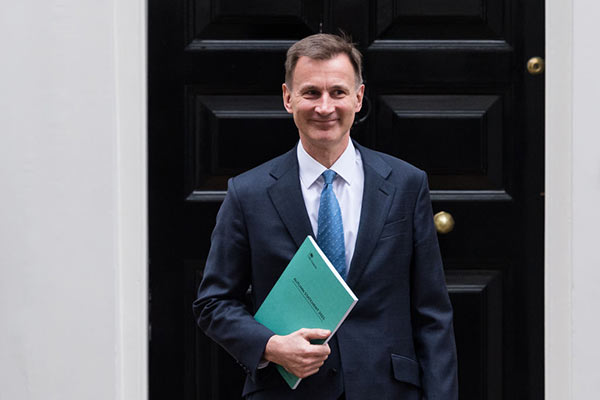Autumn Statement 2023: what does it mean for you?
From tax cuts to the triple lock and ISAs, plus a groundbreaking shake-up to workplace pensions, Craig Rickman examines how today’s big fiscal event will impact your finances.
22nd November 2023 14:59
by Craig Rickman from interactive investor

What a difference a year makes. Roughly 12 months ago, Chancellor Jeremy Hunt reversed most of the tax cuts proposed by his predecessor Kwasi Kwarteng in his ill-fated mini-Budget, to avoid plunging the UK economy into turmoil.
But at his 2023 Autumn Statement delivered to the House of Commons earlier today, Hunt unleashed a whopping 110 measures - including eye-catching tax giveaways for workers and businesses – in a bid to turbo-charge growth. This is despite previously warning that tax cuts were “virtually impossible” as looser fiscal policy might inflame stubborn inflation.
- Invest with ii: SIPP Account | Stocks & Shares ISA | See all Investment Accounts
The chancellor also unveiled plans to consult on a groundbreaking shake-up to the workplace pension landscape, while reforms to individual savings accounts (ISA) were found lurking in the summary document - more on these further down.
Why the U-turn on tax cuts?
The chancellor’s stark about-face on tax cuts is believed to have been made possible by several developments which have buoyed the UK’s economic outlook. Inflation has eased to 4.6%, borrowing costs have been lower than expected, and tax receipts are swelling.
Laura Trott, chief secretary for the Treasury, said on Tuesday: “The economy is in a very different place to where we were a year ago and we can now focus on going for growth, pushing up the growth rate of the economy and cutting taxes for individuals.”
This year’s Autumn Statement had been billed as a path to lower taxes, with extra financial support for low-to-middle earners a key target for the government. So, did the event live up to its billing?
- HMRC tax raid hits savers: tips to protect your income
- Interest rates held again: prepare your portfolio for the next phase
Let’s examine what the chancellor has announced and explain how it might affect you.
But first, here’s a quick round up of the economic outlook.
Inflation and growth
According to Hunt, the Office for Budget Responsibility (OBR) forecasts that inflation will fall to 2.8% by the end of 2024, and to 2% during 2025.
In terms of Gross Domestic Product (GDP) the OBR has downgraded its forecasts from earlier this year. It expects the UK economy to grow 0.7% in 2024 and 1.4% in 2025, a marked fall from March’s predictions which were 1.8% and 2.5% for 2024 and 2025, respectively.
Triple lock ‘honoured in full’
There was good news for pensioners as Hunt kept his promise to maintain the triple lock, with the state pension set to rise 8.5% from April in line with average wage increases. The government was reportedly mulling a lower increase of 7.8%, which stripped out one-off bonus payments to civil servants and NHS staff but has honoured the triple lock in its absolute form.
This means that from April, the basic state pension will rise by £13.30 a week to £169.50 (£8,814 a year), while the full state pension will hike £17.35 a week to £221.20 (£11,502 a year).
- Autumn Statement 2023: NatWest retail share offer plus boost for UK stocks
- Day in the life of a chief investment officer: Artemis’ Paras Anand
Boost to workers and low earners
Hunt announced several reforms that will prop up workers’ pay packets.
First, the main rate of employee Class 1 National Insurance (NI) will drop from 12% to 10% from January 6, with 27 million workers set to benefit. According to government calculations, someone on the average UK salary of £35,000 will save £450 a year.
Second, Hunt shook up the tax system for self-employed workers, abolishing Class 2 NICs and reducing Class 4 NICs from 9% to 8%, due to take effect from April.
Class 2 NICs are a fixed weekly amount paid by sole traders and partnerships. The current rate is £3.45 per week for 2023-24. Scrapping them could save self-employed workers £190 from next year.
Class 4 NICs are paid on profits. From April, on profits between £12,570 and £50,270 you will pay 8%, and 2% on anything above. As a result of the one percentage point reduction, sole traders and partnerships could save up to £377 a year.
And third, yesterday it was revealed that the national living wage will rise from £10.42 an hour to £11.44 an hour from next year, a mammoth 9.8% uptick, with the policy extended to 21-year-olds for the first time. Nearly three million workers are expected to benefit from this measure, worth up to £1,800 for those working full-time.
Meanwhile, benefits and Universal Credit will uprate by 6.7% from next year, a £470 boost for 5.5 million households, according to the chancellor.

Support for businesses
There was good news for businesses, after the chancellor extended full expensing relief from three years to indefinitely.
This policy was launched at this year’s Spring Budget and allows companies to claim 100% capital allowances on qualifying plant and machinery investments from April 2023 until the end of March 2026.
But Hunt’s reform means businesses may be able claim up to 25p for every £1 they plough back into their company with no end date. The chancellor described it as “the largest business tax cut in modern times”.
Pension ‘pot for life’
The workplace pension landscape could be set for a major overhaul. Hunt announced the government will consult to allow workers a “pension pot for life”. In short, this means instead of being forced to join your company scheme to enjoy employer contributions, you can select a provider of your choice, and this pot can follow you throughout your career.
- Seven pension tips I learned as a financial adviser
- Five questions to ask about your workplace pension
Under the current auto-enrolment system, every time you switch companies you enrol on to a new pension scheme. The problem here is that given workers typically change jobs several times during their working lives, they will inevitably accumulate multiple pension pots. Not only can this result in an administrative headache, but it can also increase the risk of pensions being lost, misplaced, or neglected.
In response to the policy, interactive investor’s head of pensions and savings, Alice Guy, said: “The current system where pension savers usually get no choice on their workplace pension provider is well overdue a shake-up. We need to see more details on the potential ‘pot for life’ changes to see how much difference they could make for pension savers.”
Major ISA reforms
The chancellor made no mention of ISAs in his speech, but some key reforms were included in the written document.
Several changes to the ISA landscape have been put forward over the past few months, but only some have the made the cut. From April, you will be allowed to invest in more than one type of ISA in any given tax year, a major development. As things stand, you can only invest in one of each.
Meanwhile, the government intends to permit the facility to hold fractional shares in any ISA wrapper – good news for stock traders.
- Autumn Statement 2023: the ISA rule changes, and the tweaks not made
- Eight tips to become a savvy ISA investor
Elsewhere, Innovative Finance ISA providers will be allowed to include long-term asset funds, and open-ended property funds with extended notice periods, from April 2024.
The mooted extra £5,000 allowance to invest solely in UK shares was a notable absentee, meaning the current annual limit of £20,000 remains. The government also opted against launching a “Super ISA”, which aimed to merge the Stocks and Shares and Cash versions into a single wrapper.
IHT and income tax on back-burner?
On Friday 17 November reports surfaced that Hunt was eyeing up inheritance tax (IHT) reforms, including plans to slash the 40% headline rate to either 30% or 20% and overhaul the tax-free thresholds. The government, however, has left the existing system unchanged - for now at least. There’s every chance IHT may feature at next year’s Spring Budget, as the Tory Party launches a final bid to retain power with an election expected to be called shortly after.
The same applies to income tax. Pre-Budget leaks suggested there might be cuts here. But much like IHT, this could be placed on the back-burner as a pre-election crowd-pleaser.
These articles are provided for information purposes only. Occasionally, an opinion about whether to buy or sell a specific investment may be provided by third parties. The content is not intended to be a personal recommendation to buy or sell any financial instrument or product, or to adopt any investment strategy as it is not provided based on an assessment of your investing knowledge and experience, your financial situation or your investment objectives. The value of your investments, and the income derived from them, may go down as well as up. You may not get back all the money that you invest. The investments referred to in this article may not be suitable for all investors, and if in doubt, an investor should seek advice from a qualified investment adviser.
Full performance can be found on the company or index summary page on the interactive investor website. Simply click on the company's or index name highlighted in the article.